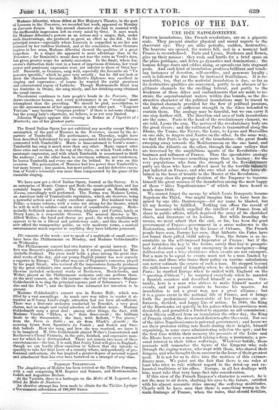The concerts of the week—not to speak of a multitude
of small ones— have been the Philharmonic on Monday, and Madame Goldschmidt's on Wednesday. The Philharmonic concert had two features of special interest. The first was Bennett's pianoforte concerto in C minor, performed by Miss Arabella Goddard. The piece itself holds a place among the great chat- sical works of the day, and our young English pianist has now scarcely a superior in Europe. The other was one of Paganini's concertos, played by his pupil Sivori • who revived all the impressions formerly produced by the great violinist's own marvellous 'performances. The programme likewise included orchestral works of Beethoven, Mendelssohn, and Weber, played as the Philharmonic orchestra only can perform them. At the next concert, on the 23d instant—the last of the season—Madame Goldechmidt is to sing the principal soprano part of Schumann's " Para- dise and the Peri "; and the Queen has intimated her intention to be present.
Madame Goldschmidt's concert was in Exeter Hall ; which was filled by a vast assemblage. As much care was taken to render it at- tractive as if Jenny Lind's single attraction had not been all-sufficient. There was a first-rate orchestra conducted by Benedict, a very good chorus, and an-ample and varied selection of excellent music. Madame Goldscbmidt sang a great deal : among other things, the duet, with Madame Viardot, " Ebben, a M," f,uui Semiramide ; the brilliant Smile to the Sonnambula ; the duet, with Belletti, " Per placer," from the Turco in Italia ; an air from Gluck's ..4rtnida ; the morning hymn from Spontini's La Vestale ; and Scotch and Swe- dish ballads. How she sang, and how she was received, we leave it M be imagined. M. Otto Goldchsmidt played Weber's Concertstack and Beethoven's Choral Fantasia, in the pure, finished, and expressive man- ner for which he is distinguished. There yet remain two more of these entertainments—the last, it is said, that Jenny lind will give in England ; though we can hardly allow ourselves to believe that she intends so speedily to take her final leave of a country where, independently of pro- fessional enthusiasm, she has inspired a greater degree of personal regard and attachment than has ever been bestowed on a stranger of any class.


























 Previous page
Previous page